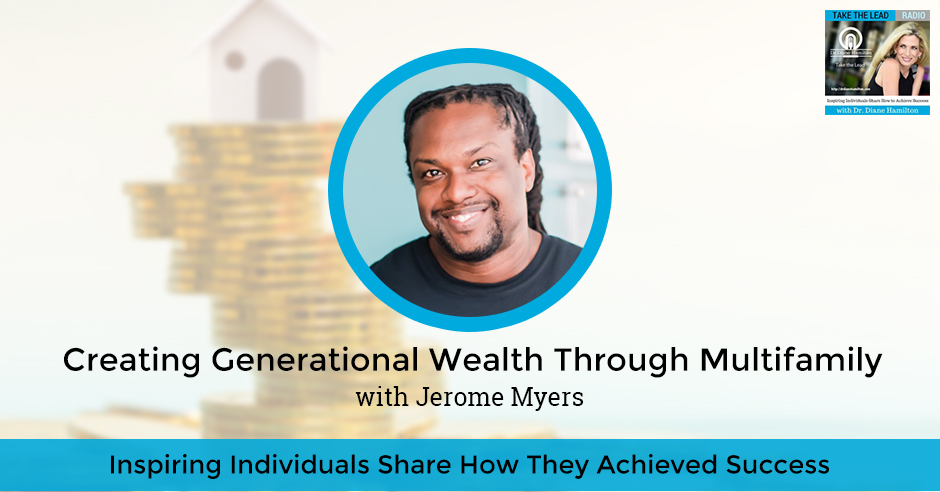There’s a great opportunity for people to create generational wealth through multifamily real estate ownership. Although getting from 0 to 1 is the hardest thing to do in this space, but once you close that first deal, things happen a little bit quicker and easier. Joining Dr. Diane Hamilton on today’s podcast is Jerome Myers, the Founder of The Myers Development Group and the host of the Multifamily Missteps Podcast. Jerome does leadership coaching, corporate exit plans, and multifamily real estate coaching. If you want to know how you can build wealth through multifamilies, you don’t want to miss this show as they discuss the merits of multifamily real estate and how you can grow and create the things you want.

I’m glad you joined us because we have Jerome Myers here. He’s the Founder of The Myers Development Group. We are going to discuss multifamily real estate coaching and how to improve. We’re also going to talk a little bit about perception.
—
Watch the episode here:
Listen to the podcast here
Creating Generational Wealth Through Multifamily With Jerome Myers
I am here with Jerome Myers, who is the founder of The Myers Development Group and the host of the Multifamily Missteps Podcast. He is the pre-eminent authority on dream realization. It’s nice to have you’re here, Jerome.
Diane, I’m glad to be with you. Thank you so much for having me on.
You’re welcome. I was looking forward to this. Johnson Horn introduced us and he said that you did some amazing things in the real estate market. I’m very curious to know more about what you work on. You do leadership coaching, corporate exit plans, and multifamily real estate coaching. I looked at some of the stuff you listed but I want a backstory on you. How did you get to this level of success?
My claim to fame was building a $20 million division for Fortune 550. My reward for that was laying folks off. We had a 30% profit margin that year and I get a phone call on Christmas Eve and it says, “Jerome, it’s been a good run but we’re going to have to lay some folks off.” I’m like, “What do you mean? We need these folks next year. We shouldn’t do that.” He’s like, “We’re going to do that.” We went back and forth for a while and got close to 5:00. He said, “This is what we’re doing. You can participate and be a part of it or not, but you have to lead the team next year. It’s in your best interest to make sure that you pick the right folks going forward.”
I spent that Christmas and through New Years’ figuring out who’s going to be on the team going forward. The thing that got me through was a promise to myself that I would never do it again. Fast forward to Thanksgiving of the next year, I’m telling people not to spend their Black Friday check because I’m not sure what’s going to happen through the holidays. It was at that point that I decided that I was going to leave Corporate America because I got to make all the decisions until it was time to lay folks off. I didn’t have a whole lot of say and I wanted more control over the people that we’re rearranging their lives to help us accomplish what we thought was a worthy mission. When I got ready to leave, I was like, “What am I going to do?”
I’ve been in engineering and project management for many years. I thought back to a conversation I had on the stoop in college. My buddy Duron and I were sitting there, and we started doing math because that’s what engineering students do in their free time. I was paying $395 and I had two roommates doing the same thing. It was a three-bedroom apartment that we had and then downstairs, he and his two roommates were doing the same thing. When we multiplied it all out, the guy was making $700,000 a year but we never saw him. We never talked to him. I was like, “This is phenomenal. Let me see if I can go get that dream off the shelf and start living that out.” That’s how we got to the multifamily. I think about myself as somebody who develops people and places. When I left corporate, the thing I miss most was helping groom leaders, grow them, and help them create the things that they wanted. I wanted to get back into that. That’s how we got back to the coaching space.
Are you still doing your podcast?
I do. You introduced with MultiFamily Missteps. We also have one called Dreamcatchers. Both of those release weekly. Dreamcatchers tells the stories of people who’ve exited the matrix or Corporate America. The whole thought is there are a lot of people doing work that they’re not passionate about, and they dream or desire to do something else. We want to give them the social proof that they can live out their wildest dreams. That’s what that podcast is all about. Multifamily Missteps is one that we do. It’s a weekly podcast and we got tired of the HGTV branded. Everybody makes money all the time, there are no issues, and nobody makes any mistakes. I got sick of that. I wanted to tell the real story because I was learning that wasn’t the truth.
[bctt tweet=”You don’t have to make the same mistake that somebody else did because you could learn from their challenges. ” via=”no”]
It’s deflating when everybody was successful and not making any mistakes, and you are. For me, in multifamily, you aren’t competing with the other people who do multifamily. If they do well, then you do well because in that sense, all the rental rises and people will buy the stuff that they should buy instead of stuff that they shouldn’t, which if you have the investors, you potentially lose investor’s money. What I wanted to do was try to create a world, a space or community where people were sharing their knowledge and you didn’t have to make the same mistake that somebody else did because you could learn from their challenges.
It’s amazing how Photoshopped or edited the world seems. In social media, everybody shares all the good stuff. I love that you focus on the world that is not always perfect. There are going to be issues. When you deal with multifamily, are you talking about duplexes? How much are we talking size–wise?
We target stuff that’s between 10 and 100 doors. When people are getting into this space, I encourage them to do a deal that’s somewhere between 10, 25, or 30 doors, and that gets them into the commercial real estate space and get some good experience. Those deals are the hardest to operate. Once they get that type of thing done and they prove they can make money, then when they go do the bigger stuff, it’ll get easier. That’s the way you should learn.
I’ve worked in residential real estate and lending, and I worked in a lot of different areas. I always find it fascinating how some people are super successful. A lot of it is mentoring from good people. Some of it is luck, some of it is timing. It’s an interesting area to be in. You and I had talked about you doing a conference that’s coming up March 19th through the 21st of 2021. I’m curious what your conference is about because we didn’t get a chance to talk about what your conference is. Who’s going and where is it? I want to hear all about it.
It’s virtual so everybody can come. In 2020, we had people from as far away as Canada. We’ve got actual speakers. One is coming from London, another from Barcelona, Spain. Most of the other people are going to be stateside. The whole point of the conference is to talk about multifamily investing. This isn’t a brag fest where people talk about how many millions of dollars or hundreds of millions of dollars of assets they have under management, or how many doors they have. It’s not a pitchfest. We want to bring people in so we can sell them some high–ticket mentoring program. The goal here is to give people that inspiration, education and direction that they need from people who are relatable, who are willing not to pretend like everything is perfect in the world and everything went as planned, so that they can go into this thing eyes wide open.
There’s a great opportunity for people to create generational wealth through multifamily real estate ownership. Duron and I didn’t go on that path when we were sitting on the stoop because we didn’t have access to anybody who was doing it. We never saw the guy. We never had the opportunity to talk to him. He had third party property management managing the property. That was our interface. Getting to a person who has done it and was doing it was out there. We didn’t know how to do it. I created a conference for people like us. To give them access to folks who may not be so far away that they can’t imagine being able to reach the level that they’ve gotten to. There will be some people that have large holdings that speak because I want people to see how big it can be.
There are also going to be people who have done their first deal. They can talk intensely on the process from getting from 0 to 1 because I personally believe that’s the hardest thing to do in this space. Once you get to one, then things happen a little bit quicker and easier because you have some credibility because you’ve closed on something. That’s the whole thought process. We are going to have the most diverse multifamily investing conference in the country. We will have pound-for-pound, more women and more minorities from a race standpoint than any other conference that’s being organized.
I’m curious at how much money you need to get started in that investment. How do they get the funds? What’s the basics on that for somebody who’s not already doing that and they’re thinking of doing it?
I don’t know that there is a specific amount that you need. I won’t tell anybody that this is a no money, no credit, no anything and no experience. I don’t pedal that because I don’t think that’s real. Those strategies are for people who have a lot of money, assets and experience because you have to be able to maneuver in the knowledge and experience. That is what’s valuable. I think you need to have $10,000 to $20,000 if you’re interested in investing in this. What makes a person valuable, and I didn’t understand this going in, was the deal. Being able to find a deal is what makes you valuable. In order to be able to find the deal, you need knowledge. I probably put the cart before the horse, so let me back up.
Every investor is trying to overcome four challenges, that is knowledge, deal flow, experience and capital. They need to overcome those four challenges in that order. It doesn’t matter how much money you have if you don’t have experience because the vast majority of these transactions have some type of bank financing attached to it. The banks don’t invest with people who don’t have experience. You need to experience before having all the capital. If you don’t have a deal, the experienced person isn’t interested in participating.
There are a lot of things that are offered for sale. It doesn’t mean that you can make money with them. When I talk about a deal, I’m talking about a piece of real estate that you can buy, operate well, and make a profit from. Going back down to the bottom of the foundation is the knowledge. It is one of the cheapest things that you can get. You apply that against the things that are offered for sale. You figure out which one is a deal. You bring that to somebody else who has experienced to ensure that it’s a deal, so you don’t get hurt. You talked about mentorship already. Usually, those folks have connections to the bigger capital so that everything comes together. In an ideal world, that works a high percentage of the time. There are a lot of other strategies out there, but my engineering and project management mind, that’s the way that we put it together. We’ve been able to create some great success that way.

It’s a very challenging field. I loved being in lending. I liked being in a lot of the real estate aspect, particularly lending. I know you had to start by getting rejected by a lot of banks. Didn’t you have hard money lending at the beginning? How did you get your first deals financed?
I did some fix and flips and I did have hard money. It was painful but the story that you’re talking about and I appreciate you doing the research, was when I went and grabbed that dream off the shelf and said, “I’m going to go through the bank.” I knocked on the door at one bank and said, “Don’t you want to give me $1 million?” They said, “Why would we do that?” I said, “I built this business. We had 30% profit margins. I got my MBA. I got my engineering license.” All these things work. They’re like, “No.” I said, “I got an 800 credit score and I got some money in the bank.” They say, “No. You don’t have experience doing what you say you want to do.”
I was like, “What do you mean?” They said, “Go find an experienced partner.” That’s why we set up the four levels the way that I did. I went and did that to ten different institutions. What happened was I did what I could. My mom always told me, “Jerome, don’t sit in the car with the flashers on. Get out and start pushing it and people will come push with you.” I started fixing and flipping because that’s what I could get into. I’d been lending money privately as a hard money lender when I was in Corporate America. I was like, “Those guys aren’t that smart. Of course, I can do that plus I watch HGTV. I knew everything I needed to know in order to do a fix and flip.” I go and start doing that. I’m sitting on a stoop and a guy pulls up in a white Dodge Ram. He’s like, “Let me check out your property. We’re getting ready to do one down the street, we want to make sure the finishes are comparable to whatever you’re going to list on because we’re going to use you as a comp.”
He starts talking. Eventually, he asked about the property that I was trying to buy 4 or 5 months earlier. I was saying, “Please don’t leave me out. I absolutely want to be in this deal with you.” He said, “What are you going to do? What are you bringing to the table?” “I don’t know, we’ll figure it out, just don’t leave me out. The bank said I need a partner. You’re the guy.” Because I couldn’t articulate what I could bring to the table because I didn’t have the appropriate knowledge, he went and made the offer without me. I’ll skip to the end of the story. I ended up in that deal with him as part of a five-man team that did our first project. It was a heavy value–add. The banks were absolutely right. Had they given me the money to do the project the way that I wanted to do, I would have failed and went bankrupt.
[bctt tweet=”Being able to find a deal is what makes you valuable. In order to be able to find the deal, you need knowledge. ” via=”no”]What did you want to do differently that you learned you wanted to do by being part of that group?
We did the exact same business plan, I didn’t have enough money. I would have ran out of money and the bank doesn’t give you more money without you putting more money in. I would have ran out of capital. That’s the game. I appreciate you asking, how much money does a person need to have? A lot of folks are pedaling this concept or idea that you can do things with no money. You can if you have a ton of experience, but if you don’t have any experience then you need to bring some cash to the table. You don’t have to bring all of it but you will need to be able to bring some because there are a lot of things that you have to pay for along the way. I appreciate the banks protecting me from myself because I didn’t know what I was doing. That’s the whole reason why you need the experience as well.
I meet a lot of people who were super successful because they got into commercial real estate. It could be very lucrative. What are you saying to people who are asking now, especially if it was office spaces? We have commercial buildings that are empty because a lot of people are having to work at home. They’re saying, “We don’t need you to work here anymore. We’ll find a space that’s big enough for this meeting or that meeting. We don’t need all these different individual offices.” What has that done to the commercial real estate market? Are you dealing with that when people talk to you?

There are different sectors. Office, multifamily, industrial, warehouses and self-storage has its own space. Each one has its own challenges and even hospitality. Multifamily is something that thankfully can be outsourced. There’s going to be an even higher demand going forward. I don’t know what’s going to happen with the economy, but I don’t think there are going to be as many people in single-family homes as they have been in the past. There are going to be some adjustments and changes. I might be naive but I still like the office.
There are going to be places and owners where they want people to come. That is still part of the old-school way of thinking. I believe that you need to come into the office and be in each other’s physical presence. I have no idea how long the pandemic is going to last or how are we going to ease back into being face-to-face. For the folks who enjoy the face-to-face stuff, they are going to be excited to be able to go somewhere. I don’t think everybody is going to be interested in having someone come to their home. They are going to want some place to meet.
I never was in the commercial real estate market either. I didn’t deal so much with multifamily but I dealt with residential, in general, single-family. You read so much of what’s going to happen if we get so much more Uber companies. We won’t even need cars anymore, so why do we need a garage anymore? What’s that going to do to the parking lots if we don’t need all these cars? It’s a fascinating area to look at what’s going to happen. What do you think are the biggest things that are going to happen in residential real estate? Do you think we’ll see some of those as soon? Do you think all of that is a way off?
[bctt tweet=”Knowledge is one of the cheapest things that you can get. ” via=”no”]I don’t think it’ll happen in my lifetime. At the end of the day, how long do you have to wait for Uber and the convenience of being able to get in and go is valuable for a lot of folks. The vast majority of people, especially in my generation, the biggest freedom lever for me was getting a car. The thought of not driving for me is scary. There are a lot of folks who are 16 to 18 who aren’t pressed to get a license and aren’t beating down the door of their parents saying, “I want a car. I want to be able to drive.” That was the thing I wanted more than anything. My 21st birthday didn’t matter. Being able to get behind the wheel of a car, turn up the music loud every now and again, and not have somebody look at me or driving with one hand, that stuff was exciting for me.
I don’t see it going away because that’s where the majority of the population is, my age and older. They have similar sentiments. For the folks later, I can see some shifts but I don’t think short range that it’s going to be a real impact, at least, not in the suburban areas. I guess that’s the last thing I’ll say. In the urban areas, it’s more convenient for Uber and so on but with COVID, people are leaving the core assets and getting more spaced out. If I got to wait 15 to 20 minutes for an Uber to come get me and I could go through the store and come back in the same time, I’m probably going to want my own vehicle.

Are most people getting into limited partnerships doing this or are they doing this on their own? Do people come to you for advice?
We usually recommend that people use limited liability companies or LLCs. The structure is easier and it’s more fluid. More often than not, it’s a small cluster of folks pooling their capital together to do the deal in what we call a joint venture.
When I purchase any real estate, I put it in an LLC. It’s something that many people don’t do. They don’t think about it. It’s important to protect yourself. Do they still have the 1031 Exchange? It’s been a while since I’ve been in this field, so bear with me. If you purchase a property and then you exchange it for a like-property then you don’t have the same tax situation. Does that still go with multifamily? I didn’t deal with multifamily. How does that work in that field?
It works in multifamily. I’m not a tax professional. They should talk to their tax preparer about it, but at the highest level, you get to defer your taxes. If you roll into another property, then they kick the can down the road and you ride it until you die. Eventually, you never paid taxes because when you pass it to the next generation, the cost basis steps up to whatever it’s worth, then it reduces the tax liability. That’s a strategy that a lot of people use, but the opportunity zones are available. There are people who have opportunities on funds. If you’ve got some capital gains, you want to invest them, and get some benefit off of that while deferring the taxes, then that’s another option that people should explore, especially if they’re getting a little leery about the stock market or anyone to harvest the equity that they have there.
We’ve seen a huge price increased here in Arizona. A lot of people from California are moving to Arizona. A lot of it is inflated here maybe. I had a famous economic professor on the show and I was asking him about what’s happening with inflation. If they’re going to print money, aren’t we going to see inflation and when are we seeing it? He says, “We’re seeing it in the real estate market.” Do you think that these prices will continue to go up? Is this a good or a bad time to get in?
This goes back to leads versus deals. If you have the knowledge and you can evaluate the property that you’re buying, it is a good time to buy. If you don’t know what you’re doing, you can very quickly and easily overpay, and then you have to rely on the economy to save you.
He was saying he thought it will continue to be pretty good. It’s made a huge difference here. I’m fascinated to watch real estate markets and see what’s going on. I was glad I bought mine when I did. I don’t have to worry so much on my home, at least. It’s fascinating to see what you can learn about investing. I’m always fascinated by real estate in general. A lot of people will think about going into that realm of multifamily. If they want to attend your event or want to find out more about you, is there some site or something you want to share?

I deeply appreciate the opportunity to do that. The best place for the audience to go would be www.JeromeMyers.co. They can see there everything we have going on, both in the development of people and the development of places. If they scroll down far enough, they’ll see the Mid-Atlantic Multifamily Investing Conference. If they hit that link, they’ll get to see all the speakers. We’ve got 25 speakers. It’s spread across those three days. We are going to give and try to deliver maximum value for everybody who comes in and attends.
That’s great, Jerome. Thank you so much. A lot of people will find this fascinating and I hope your event goes well. Thank you for being on the show.
Thank you for having me.
You’re welcome.
Important Links:
- The Myers Development Group
- Multifamily Missteps Podcast – Apple Podcasts
- Dreamcatchers – Apple Podcasts
- www.JeromeMyers.co
About Jerome Myers
 Jerome Myers is the Founder of the Myers Development Group and the Host of the Multi-Family Missteps and Dreamcatchers Podcasts.
Jerome Myers is the Founder of the Myers Development Group and the Host of the Multi-Family Missteps and Dreamcatchers Podcasts.
He is the preeminent authority on dream realization.
Love the show? Subscribe, rate, review, and share!
Join the Take The Lead community today: